[247 Every Moment] Post-Roy America: Losing the right to abortion is just the beginning
In 1972, Chicago Police Department homicide detective Ted O'Connor took on a case. In July of that year, he and his partner raided an apartment in Chicago's South Shore neighborhood, where 50 women were at the time. Ultimately, Chicago police charged seven of them.
They are a women's group that calls themselves Jane, and before that, they provided safe abortions to more than 3,000 women in Chicago. At the time, only Alaska, Hawaii, New York, and Washington had repealed anti-abortion laws in the nation, and in the rest of the states, abortion was a criminal offense. The seven women have been charged with 11 counts of abortion and conspiracy to have an abortion, and in the worst-case scenario, they will each be sentenced to 150 years in prison. To protect women using abortion services, team leaders ate registration cards with patient information in police cars.
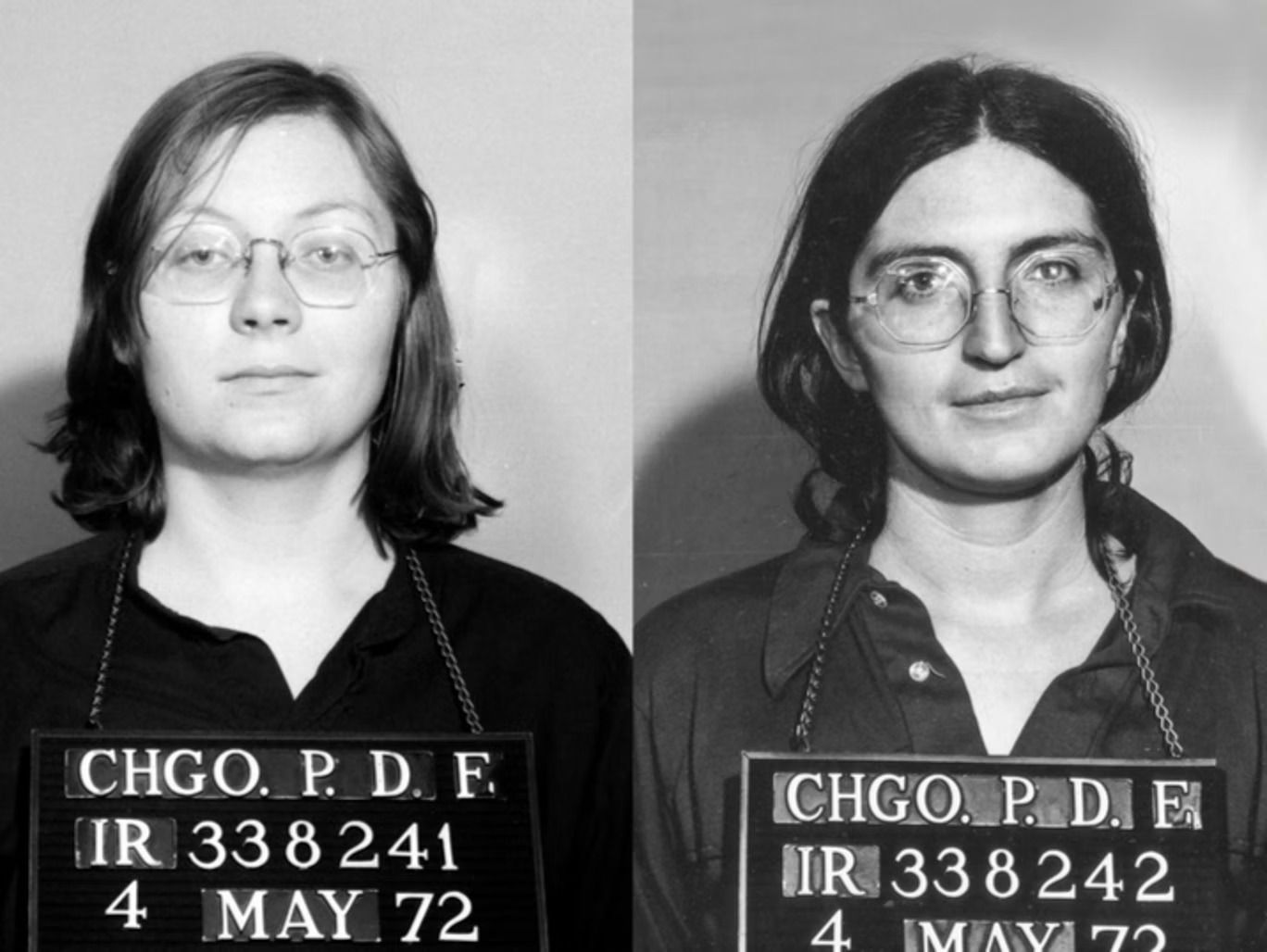
Six months later, on January 22, 1973, the U.S. Supreme Court ruled Roe v. Wade with a 7-2 vote, saying that the law prohibiting abortion violated women's privacy rights. The violation is so broad that it violates the due process requirements of the Fourteenth Amendment to the U.S. Constitution. Abortion becomes a right protected by the U.S. Constitution, and the Chicago Attorney's Office has dropped the indictment against Jane's team.
Now, June 24, 2022, as previously leaked draft estimates, the U.S. Supreme Court in Dobbs v. Jackson Women's Health Organization stated that the U.S. Constitution does not protect Abortion rights. The judgment passed by a 5:4 ratio.
Everything is back to square one.
"Must be rooted in American history and tradition"
The decision, penned by Justice Samuel Alito, argued that the right to abortion does not exist, or at least is not constitutionally protected. “The Constitution did not prohibit citizens from regulating or outlawing abortion in every state, a right that was completely unknown in American law until the second half of the 20th century.” And “a right that is protected by the Constitution but not explicitly mentioned must be rooted in the history and traditions of the United States”, therefore, the Roe decision was not only wrong, but was a serious abuse of judicial authority.
Alito in particular stressed that the Constitution neither prohibits nor permits abortion and that "the court's decision today does not prohibit abortion in the United States". Both the "Constitution and the rule of law" require that the legality of abortion be left to the states to decide for themselves. Even Alito specifically pointed out that because "the right to interstate travel guaranteed by the Constitution is inviolable," any statute that prohibits residents of this state from going to other states for abortion must be unconstitutional. And "nothing in the opinion should be construed as questioning precedent that does not involve abortion".
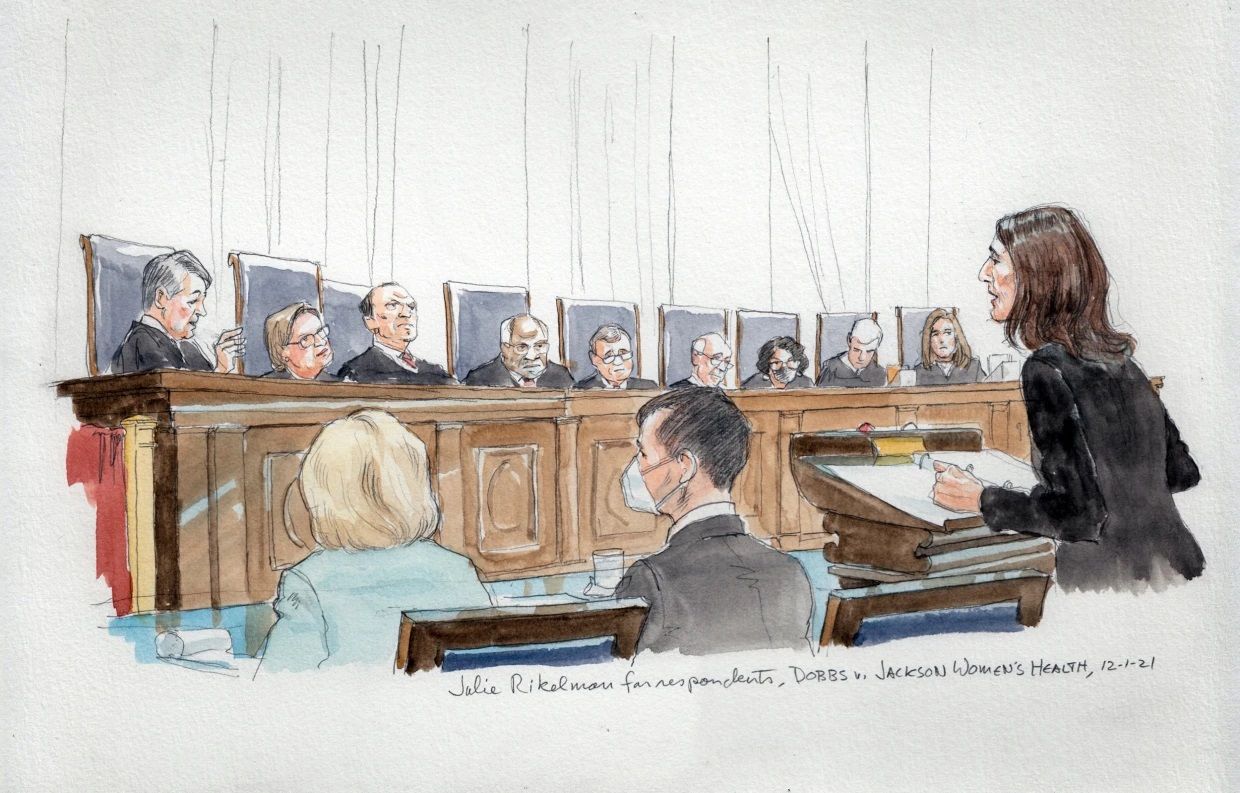
Apparently, Alito's conservative colleagues didn't think so. Instead, the longest-serving Justice Clarence Thomas said in his concurring opinion that "the justices should reconsider the results of all substantive due process cases made by this court." The dissenting liberal justice warned in a dissenting opinion that "at least one justice is ready to use today's decision to overturn precedent time and time again". This would seriously jeopardize important judgments, including Obergefell v. Hodges, which recognized the right to same-sex marriage.
Chief Justice John Glover Roberts, Jr. agreed with the constitutionality of the Mississippi bill banning abortions for women over 15 weeks of pregnancy, but disagreed that the Roe decision should be overturned entirely. He pointed out in some dissenting opinions that the complete overturn of the Roe case violated the principle of judicial restraint and "is a serious impact on the legal system."
The three liberal justices argued in dissenting opinions that the legal framework created by Roe's case has been in place for years in courts across the country. The Supreme Court's subsequent decision in Planned Parenthood v. Casey had reviewed the Roe case's grounds and again found it feasible. "There is one and only one reason for the court to change course today: the composition of this court has changed."
They also noted in their dissenting opinion that there was no language in the judgment to prevent the federal government from banning abortion nationwide. And "we believe that the Constitution upholds the right of individuals to make their own decisions and plan their own future, even in the face of public opposition".
Threatened 'everyone'
Thirteen Republican-run states, including Alabama, had enacted "trigger laws" ahead of the verdict, which would provide for an abortion ban to take effect immediately or within days of the verdict. Six minutes after the ruling was announced, the Missouri attorney general confirmed that Missouri's abortion ban was in effect. Current law in the state makes all abortions, including those performed by rape victims, a Class B felony that carries up to fifteen years in prison if convicted.
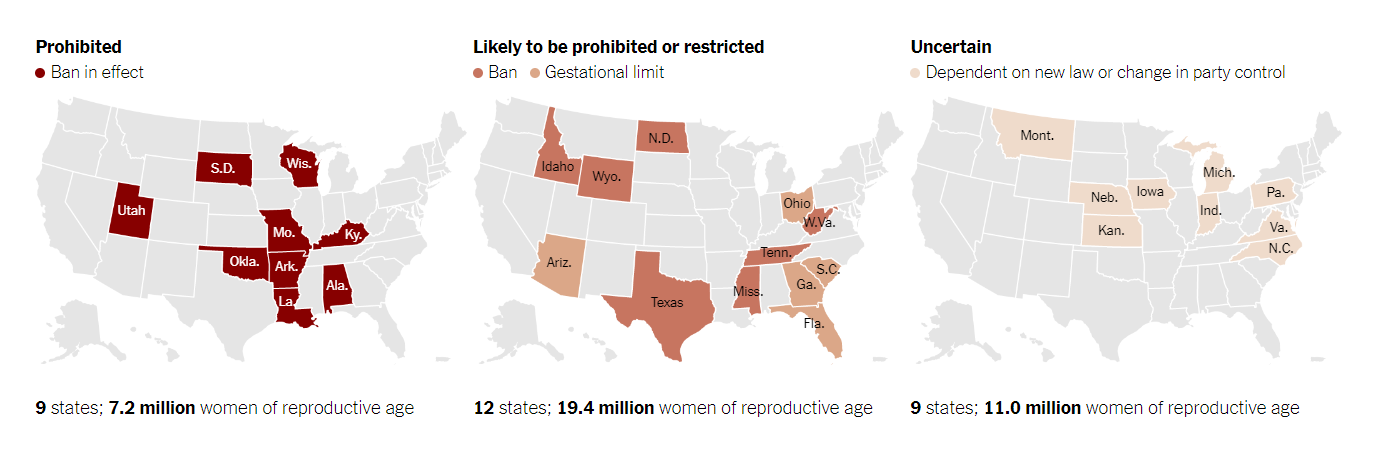
According to the "New York Times" statistics, 9 states have bans in effect, 12 states are about to take effect, and 9 states may usher in new abortion bans. The bans will affect 37.6 million women of reproductive age. Immediate or imminent abortion bans in many states were even drafted in the 19th century. Clinics offering abortion services in Kentucky, Alabama, Arizona, and West Virginia have closed immediately. For women in some states, the distance to get a safe and legal abortion will increase from 33 miles to 282 miles, according to a study by Middlebury College, a ruling that could lead to a 13 percent drop in the number of legal abortions in the United States.
Middlebury College professor Caitlin Myers and 154 economists have filed an amicus brief with the U.S. Supreme Court. The brief noted that legalization of abortion has reduced the number of teen mothers by a third, and that because of differences in the economy and health care systems, black women are more likely to have unintended pregnancies than white women, so the impact of the abortion ban has been concentrated on young women and on women of color.
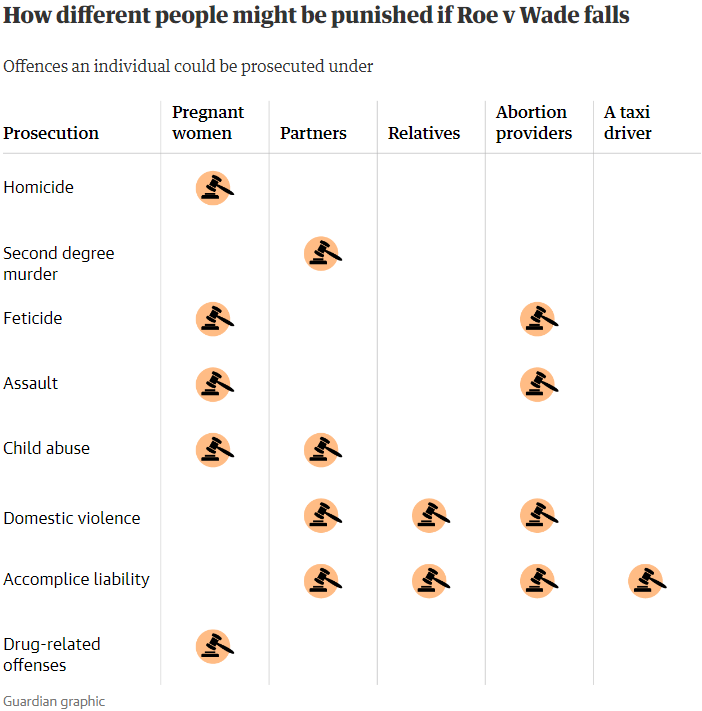
Notably, the National Association of Criminal Defense Lawyers released a report prior to the oral arguments in the Dobbs case. The report notes that some state legislatures have been "revising their criminal codes" in recent decades. Once the Roe case is overturned, the possible criminal charges for abortion will be more advanced and harsher than before the Roe case. For example, under current Louisiana law, anyone offering abortion advice, whether it's a relative, a clergyman, or a network of abortion funds or even a taxi driver who picks up the aborted person, could commit eight counts, including murder, for having an abortion. accused accomplice.
unfinished struggle
"The Supreme Court has made some bad decisions," U.S. President Joe Biden said in a speech after the verdict. "We stand ready to work with other agencies of the federal government in seeking to use their legal authority to protect and maintain access to reproductive health care," the DOJ said in a press release. At the same time, "Federal agencies may, to the extent authorized by federal law, Continue to provide reproductive health services".
American public opinion and Democratic progressives strongly call on the U.S. Congress to pass a federal law to protect abortion rights as soon as possible, but considering the current situation in the U.S. Senate, where Democrats and Republicans each have 50 seats, it is difficult for the relevant laws to be passed. Instead, Republicans have pledged to pass a nationwide abortion ban as soon as they retake the U.S. Congress in the midterm elections.
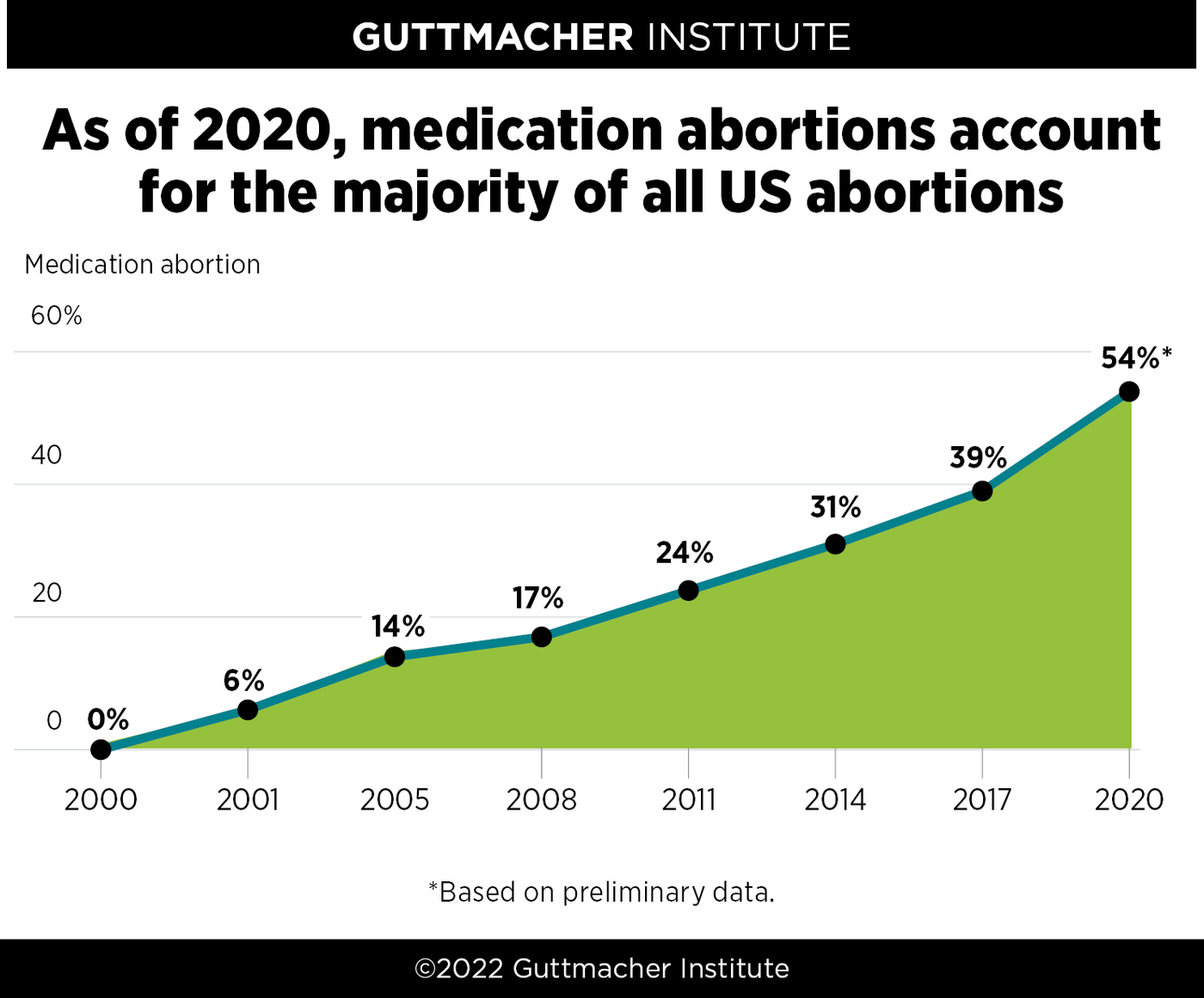
For now, aside from continuing to pass legislation to guarantee abortion rights nationwide, the next battleground will be the use of the abortion pill. This will also really determine whether the abortion ban can be effectively implemented. Since the U.S. Food and Drug Administration (FDA) approved the abortion pill, it has quickly become the most popular option for abortion, with roughly 54 percent of abortions performed each year taking the drug. On the one hand, abortion pills are cheaper than surgical abortions, and on the other hand, abortion pills are more accessible to many women who live in states that severely restrict abortion rights. In 2020, the U.S. government repealed a ban on mail-in abortion pills.
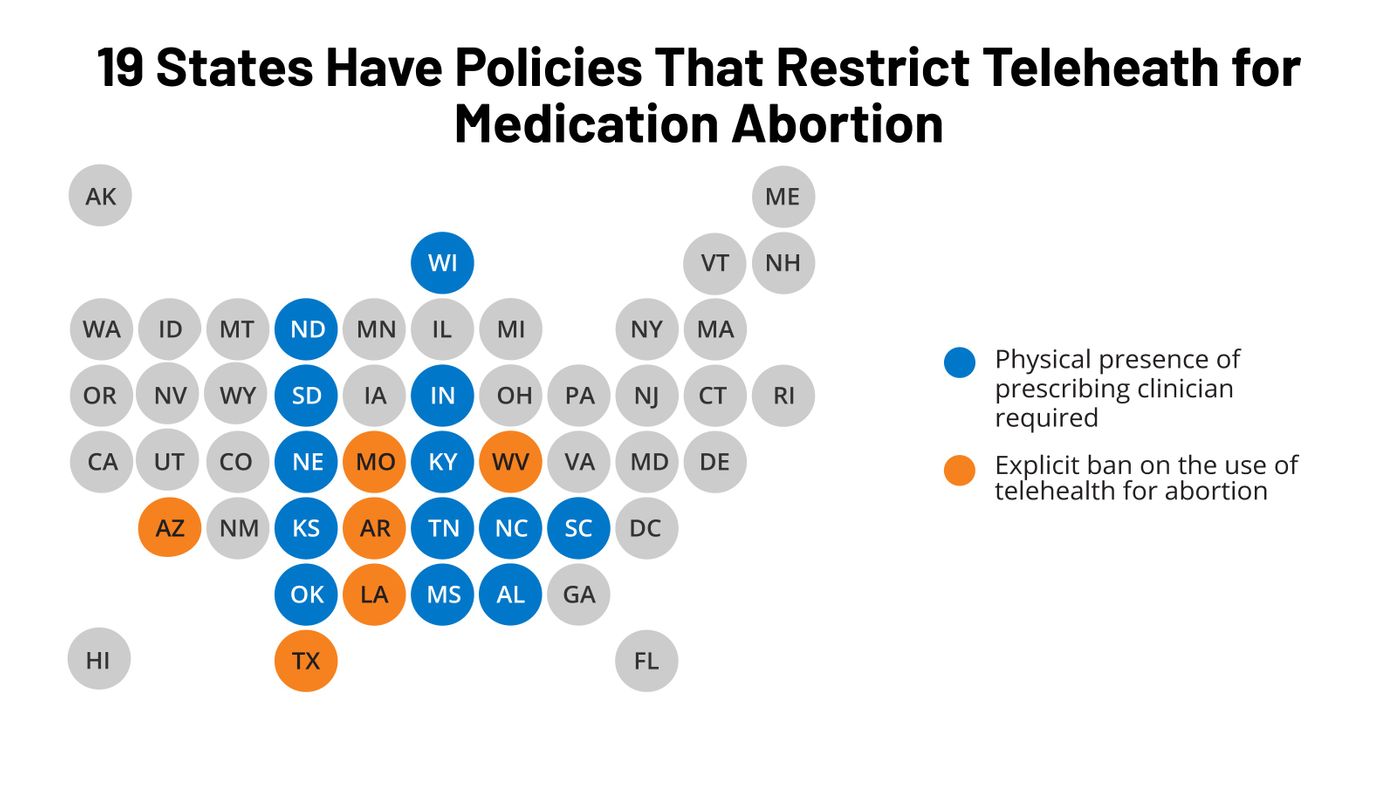
But more than 100 bills have been introduced in Republican-run states over the past few months in an attempt to limit or even ban the distribution of abortion pills. And the abortion bans that the states are passing or are about to pass effectively ban the use of the abortion pill as well. The U.S. Attorney General has stated that "states shall not prohibit the use of abortion pills based on disagreement with the FDA's expert judgment on safety and effectiveness." However, this statement will most likely be overturned by the courts. Some agencies that offer tele-abortion services have required patients to reside in and have a mailing address in a state where abortion is legal, and have discontinued services in some states due to concerns about possible violations of the law.
It is worth noting that anti-abortion activists have targeted contraception.
In early May, Louisiana failed to pass a provision that would make IUDs and emergency contraception a crime for abortion. However, the Supreme Court's 2014 decision in Burwell v. Hobby Lobby Stores, Inc. agreed with an unscientific legal inference that "life begins with fertilization, so anything that prevents fertilization Contraceptive measures for egg implantation constitute abortion". Such legal inferences could lead to contraceptives and IUDs being outlawed as well, and federal legal action would most likely be thwarted by the current Supreme Court.
For now, the push for such a ban is still in the minority, as polls show that nearly two-thirds of even Republicans support government-sponsored birth control. But most influential anti-abortion groups have publicly expressed support for restrictions on IUDs and emergency contraception.
(Editor in charge: New Bremen)
Like my work? Don't forget to support and clap, let me know that you are with me on the road of creation. Keep this enthusiasm together!
